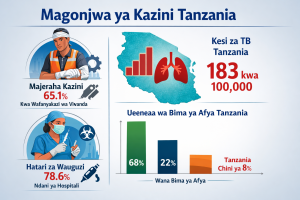
Trade Expeditions: Paving the Path for AfCFTA Success and Boosting Intra-African Trade
Expedition Tanzania
Ghana’s National AfCFTA Coordination Office (NCO) announced a planned trade expedition in Tanzania in September 2023 in collaboration with the African Continental Free Trade Area (AfCFTA). A flagship of the African Union under agenda 2063, the AfCFTA seeks to boost intra-African trade through trade in value-added productions and trade across all economic sectors. Envisioned as a game-changer for Africa’s economic growth and development, realizing these aspirations requires concerted efforts from member states and the private sector. Trade expenditures between member states are therefore a critical addition to strategies designed to drive the full potential of the AfCFTA and in bolstering intra-African trade.
The trade expedition between Ghana and Tanzania is a needed strategy in exploring opportunities for the two nations in collaborating under the AfCFTA in doing business and further strengthening bilateral talks. With a population of 1.3 billion and an abundance of resources, Africa possesses an immense potential for economic prosperity. However, trade in the continent is inhibited by highly fragmented economies, trade barriers, and infrastructural connectivity which forces nations to look for outside trade partners. Trade expenditures under the AfCFTA, therefore, promise a much-needed benchmarking tool for countries in identifying trade opportunities across the continent.
With an estimated $450 billion income boost in Africa by 2035, creating a continental market of 1.3 billion people offers immense opportunities for African people in leveraging competitive advantages, stimulate industrialization, and enhance economic diversification. However, nations need to follow the Ghana-Tanzania example by engaging in trade expeditions and collaborative efforts. This is necessary for understanding each other’s markets and building the trust that is needed to facilitate cross-border trade.
Trade Expeditions: Building Bridges of Africa’s Economic Resilience
Trade expeditions, bringing public and private entities in matchmaking and exploring opportunities in the value chain and supply chain linkages, symbolize a commitment to shared values and the creation of dynamic and resilient economic ecosystems for an economically empowered Africa. Thus, trade expeditions can be bridges of collaboration between nations providing businesses, government representatives, and industry leaders with a platform to interact and forge mutually beneficial partnerships. Expeditions can facilitate face-to-face meetings, networking events, and business exhibition forums to nurture understanding and encourage trade agreements, joint ventures, and strategic alliances. Intra-African trade currently stands at 14.4% of total African exports although the AfCFTA is expected to boost this by 33% and reduce the continent’s trade deficit by 51%. Trade expeditions can therefore offer trade partners the opportunity to explore the shared untapped potential within Africa hence promoting the exchange of goods and services between nations and consequently leading to the growth of businesses and economies.
“Trade expenditures under the AfCFTA, therefore, promise a much-needed benchmarking tool for countries in identifying trade opportunities across the continent.”
The AfCFTA is a high-ambition trade agreement that seeks to create a single African market of 1.3 billion people and tap into new markets and opportunities for enhanced development. Embracing more trade expeditions can offer nations enhanced access to newer markets and untapped business and trade opportunities. Many African businesses face significant barriers when attempting to export to other countries due to unfamiliar regulatory frameworks and bureaucratic red tape. Trade expeditions will provide an opportunity for exporters to familiarize themselves with the rules and regulations of target markets further driving smoother and more efficient trade practices. Boosting intra-African trade has the potential to further drive economic diversification. Many African economies are heavily reliant on exporting raw materials, leaving them vulnerable to commodity price fluctuations. With more nations adopting trade expedition mechanisms, more exploration of new markets for value-added products and services is possible leading to more resilient and diversified economies.
“Different African nations are endowed with different unique skills, expertise, experiences, ad technology advancements that, when shared, can collectively uplift the economic well-being of the continent.”
Trade expeditions are also conduits for technology and knowledge transfer as businesses and governments exhibit their products and innovations. Different African nations are endowed with different unique skills, expertise, experiences, ad technology advancements that, when shared, can collectively uplift the economic well-being of the continent. Put into perspective, nations excelling in renewable energy, such as Kenya, Egypt, and Morocco can share their know-how with other nations seeking to transition to sustainable energy sources. Countries specializing in agriculture can equally access opportunities to share best practices with others seeking to improve food and agricultural productivity. Thus, trade expeditions between any number of AfCFTA member states can enhance accelerated knowledge exchanges thus fostering a collaborative ecosystem for growth under the trade agreement.
The AfCFTA further seeks to eliminate trade barriers towards boosting intra-African trade, contribute to establishing regional value chains in Africa, enabling investment and job creation. Thus, Investment is crucial for economic development, and intra-African investment has the potential to create substantial positive impacts. Increased participation in trade expenditures for African nations can therefore allow countries to showcase their investment opportunities to potential investors from other nations, within and without the continent. Thus, it can effectively drive foreign direct investment as investors realize the potential and attractiveness of the various sectors. Notably, more intra-African investment creates stronger bonds between nations thus driving interdependence and potentially eliminating conflicts. A prosperous Africa, with economies linked through trade and investment, is more likely to cooperate and support one another during challenging times.



